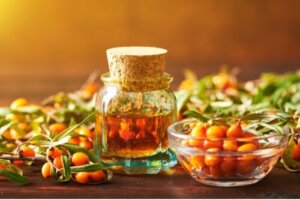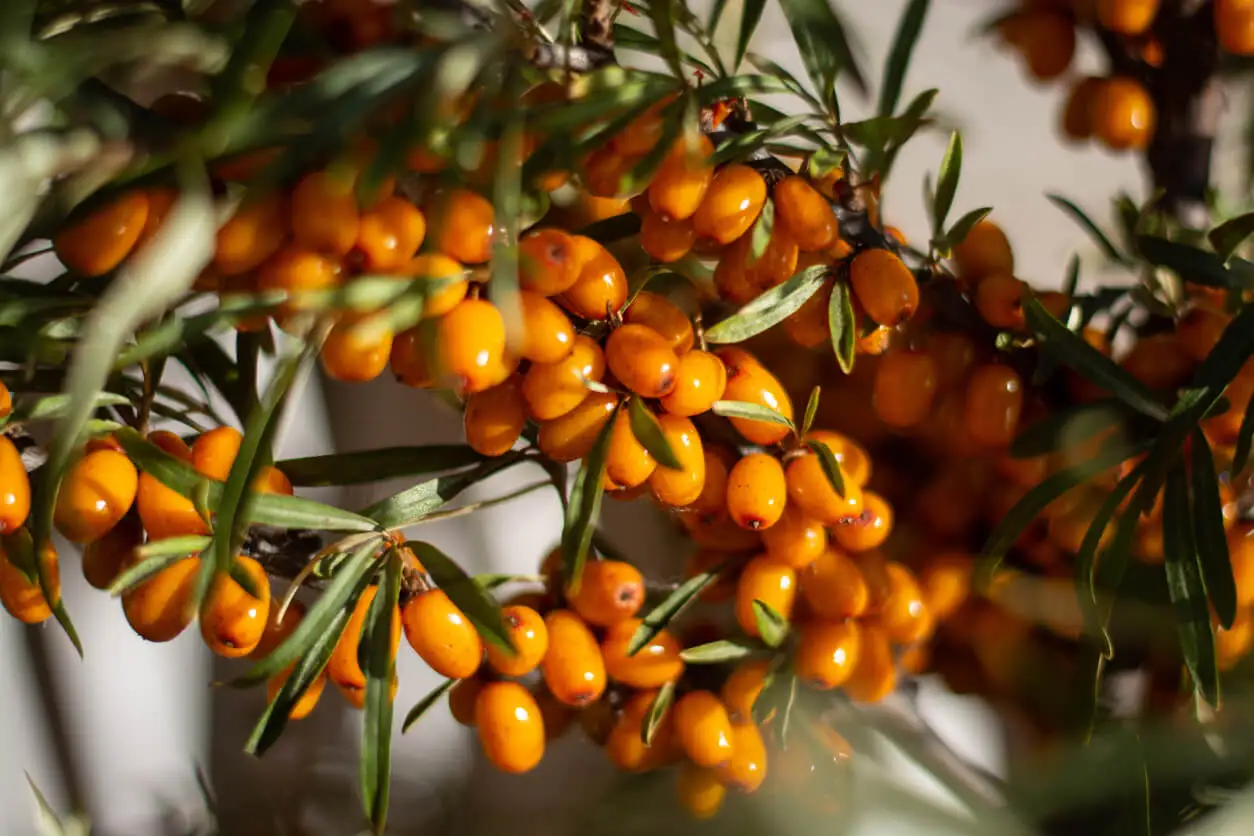Sea Buckthorn: A Plant with Skin and Health Benefits


Reviewed and approved by the pharmacist Franciele Rohor de Souza
Sea buckthorn is a thorny shrub that usually grows in soils in Asia and Europe. To be more precise, it can be found in coastal areas or in areas near rivers and streams. Although there are seven varieties of this species, the most common is the scientific name Hipphophae rhamnoides.
The leaves, flowers, fruits, and seed oils are used for the manufacture of medicinal supplements. In addition, it also has attractive cosmetic applications attributed to its abundant supply of antioxidants. Would you like to know what it’s used for? Below, we’ll fill you in on its benefits and contraindications.
Uses and benefits of sea buckthorn
In traditional medicine, sea buckthorn has been valued for its anti-inflammatory, antioxidant, healing and antimicrobial potential. As detailed in a publication in the journal Antioxidants, it’s a source of active compounds such as the following:
- Flavonoids: isorhamnetin and quercetin.
- Tocopherols: α-tocopherol, β-tocopherol, γ-tocopherol.
- Phytosterols: cycloartenol, campesterol, citrostadienol and sitosterol.
- Carotenoids: lycopene, lutein, zeaxanthin, α-carotene and beta-carotene.
- Polyphenolic compounds: gallic acid, caffeic acid, p-coumaric acid and ferulic acid.
It is not surprising, then, that this shrub – also called sea buckthorn or Siberian pineapple –has various applications in health and cosmetics. Let’s take a closer look at its most popular uses.
Read also: About Etoricoxib: An Anti-Inflammatory Drug
Skin health
The main benefits of sea buckthorn have to do with skin health. In particular, it’s associated with the prevention of premature aging, rejuvenation, and relief of some dermatological disorders.
According to a review shared in the Journal of Ethnopharmacology, flavonoids, vitamins, and unsaturated fatty acids largely account for the dermatological potential of this shrub. To be more precise, it has been observed to exert antibacterial, anti-sebum, antifungal, anti-psoriasis and wound-healing properties.
In research shared in Experimental and Therapeutic Medicine, sea buckthorn extract was seen to help reduce lesions caused by psoriasis. And while the researchers suggest more conclusive studies, the findings are considered promising.
Meanwhile, a study in Skin Pharmacology and Physiology reported that the essential oil of this plant helped reduce the severity of dermatitis. In itself, it helped inhibit the presence of chemokines, linked to inflammation, which significantly alleviated lesions.
Among other things, the plant and its derivatives are positively linked to the prevention of sun damage. A study shared in the journal Antioxidants reported that sea buckthorn seed oil has photoprotective properties that prevent UV-induced alterations from the sun.

Wound healing
Related to the above benefit, special mention should be made of sea buckthorn’s ability to promote wound healing. In animal model studies, such as one shared in the journal Burns, oil from the seeds of this shrub stimulated the epithelialization process in the skin of burn-injured sheep.
Meanwhile, a study in rats published in Food and Chemical Toxicology made similar findings. The researchers determined that sea buckthorn oil stimulated connective tissue repair in the presence of wounds.
For now, studies are limited to animal observations. Although the findings are promising, evidence in humans is needed to corroborate these effects.
High glucose control
First of all, it should be made clear that sea buckthorn supplements are not a first-choice treatment for diabetes or pre-diabetes. Due to the complexity of this disease, one should follow the doctor’s recommendations.
However, it’s worth knowing that this shrub has potential as a supplement to reduce high glucose levels. In a study reported in the journal Foods, ingestion of a sea buckthorn fruit puree for 5 weeks was helpful in stabilizing blood glucose in patients with altered levels.
Another piece of research in the European Journal of Nutrition reported that supplementation with this plant delayed insulin resistance and improved the glycemic profile after eating. Its abundant flavonoid content is linked to this effect.
Overall, studies are limited. Larger, more comprehensive research is needed to evaluate this benefit.
Other possible benefits
Given its composition and properties, sea buckthorn is an ingredient that continues to be investigated. For now, its use is considered merely complementary.
In addition to the above, it’s linked to other benefits:
- Antitumor potential. The berries, in particular, are associated with antiproliferative and immunomodulatory properties. A review in Frontiers in Pharmacology details that their content in phenolic compounds, vitamins, fatty acids, and phytosterols has positive anti-cancer effects. Human studies are needed.
- Cardiovascular health. Antioxidants concentrated in sea buckthorn derivatives are positively linked to cardiovascular health. A publication in Trends in Food Science & Technology suggests that supplementation with this ingredient helps reduce hyperlipidemia (high cholesterol) and high blood pressure. It’s considered a cardioprotectant, although more evidence is needed.
- Inflammation control. Sea buckthorn’s abundant content of antioxidants, fatty acids, and other phytoconstituents is linked to an anti-inflammatory potential that lowers the risk of chronic diseases.

Sea buckthorn side effects and contraindications
The fact that sea buckthorn is a naturally occurring supplement doesn’t exempt it from possible side effects. Only its fruit in its natural state is generally considered safe for consumption, as long as intake is moderate.
Extracts, oil, and other supplements derived from the plant should be taken with caution. It’s necessary to consult the label to avoid inconvenience. Unwanted reactions usually include gastrointestinal discomfort, such as pain, nausea and inflammation.
On the other hand, it isn’t recommended in the following cases:
- Diabetes
- Hypotension
- Small children
- Pregnancy and lactation
- Hemorrhagic disorders
- Treatments with anticoagulants, antidiabetics or antidepressants (may enhance their effect)
It’s important to keep in mind that research on sea buckthorn has been carried out mostly on animals and in the laboratory. Human studies are scarce and with low numbers. Therefore, it shouldn’t be considered a single treatment option and one should be alert to possible side reactions.
You may be interested in: Diabetes and High Blood Pressure: What Can You Eat?
What to remember about sea buckthorn?
Today, sea buckthorn is distributed as a supplement in herbal stores and pharmacies. It can be found in cosmetic products, capsules, oil and extracts, as well as other formats.
Whatever the case, it should be used with caution and following the manufacturer’s instructions.
For now, studies suggest that it has potential against some dermatological disorders, high glucose levels and cardiovascular disease. However, it does not replace the effects of a healthy lifestyle and therapeutic measures recommended by doctors.
All cited sources were thoroughly reviewed by our team to ensure their quality, reliability, currency, and validity. The bibliography of this article was considered reliable and of academic or scientific accuracy.
- Jaśniewska A, Diowksz A. Wide Spectrum of Active Compounds in Sea Buckthorn (Hippophae rhamnoides) for Disease Prevention and Food Production. Antioxidants (Basel). 2021 Aug 12;10(8):1279. doi: 10.3390/antiox10081279. PMID: 34439527; PMCID: PMC8389226.
- Pundir S, Garg P, Dviwedi A, Ali A, Kapoor VK, Kapoor D, Kulshrestha S, Lal UR, Negi P. Ethnomedicinal uses, phytochemistry and dermatological effects of Hippophae rhamnoides L.: A review. J Ethnopharmacol. 2021 Feb 10;266:113434. doi: 10.1016/j.jep.2020.113434. Epub 2020 Oct 2. PMID: 33017636.
- Boca AN, Ilies RF, Saccomanno J, Pop R, Vesa S, Tataru AD, Buzoianu AD. Sea buckthorn extract in the treatment of psoriasis. Exp Ther Med. 2019 Feb;17(2):1020-1023. doi: 10.3892/etm.2018.6983. Epub 2018 Nov 16. PMID: 30679968; PMCID: PMC6327666.
- Hou DD, Di ZH, Qi RQ, Wang HX, Zheng S, Hong YX, Guo H, Chen HD, Gao XH. Sea Buckthorn (Hippophaë rhamnoides L.) Oil Improves Atopic Dermatitis-Like Skin Lesions via Inhibition of NF-κB and STAT1 Activation. Skin Pharmacol Physiol. 2017;30(5):268-276. doi: 10.1159/000479528. Epub 2017 Sep 6. PMID: 28873377.
- Gęgotek A, Jastrząb A, Jarocka-Karpowicz I, Muszyńska M, Skrzydlewska E. The Effect of Sea Buckthorn (Hippophae rhamnoides L.) Seed Oil on UV-Induced Changes in Lipid Metabolism of Human Skin Cells. Antioxidants (Basel). 2018 Aug 23;7(9):110. doi: 10.3390/antiox7090110. PMID: 30142919; PMCID: PMC6162715.
- Ito H, Asmussen S, Traber DL, Cox RA, Hawkins HK, Connelly R, Traber LD, Walker TW, Malgerud E, Sakurai H, Enkhbaatar P. Healing efficacy of sea buckthorn (Hippophae rhamnoides L.) seed oil in an ovine burn wound model. Burns. 2014 May;40(3):511-9. doi: 10.1016/j.burns.2013.08.011. Epub 2013 Sep 3. PMID: 24007892.
- Upadhyay NK, Kumar R, Siddiqui MS, Gupta A. Mechanism of Wound-Healing Activity of Hippophae rhamnoides L. Leaf Extract in Experimental Burns. Evid Based Complement Alternat Med. 2011;2011:659705. doi: 10.1093/ecam/nep189. Epub 2011 Mar 20. PMID: 19946025; PMCID: PMC3152935.
- Ren, Z., Gong, H., Zhao, A., Zhang, J., Yang, C., Wang, P., & Zhang, Y. (2021). Effect of Sea Buckthorn on Plasma Glucose in Individuals with Impaired Glucose Regulation: A Two-Stage Randomized Crossover Intervention Study. In Foods (Vol. 10, Issue 4, p. 804). MDPI AG. https://doi.org/10.3390/foods10040804
- Mortensen, M.W., Spagner, C., Cuparencu, C. et al. Sea buckthorn decreases and delays insulin response and improves glycaemic profile following a sucrose-containing berry meal: a randomised, controlled, crossover study of Danish sea buckthorn and strawberries in overweight and obese male subjects. Eur J Nutr 57, 2827–2837 (2018). https://doi.org/10.1007/s00394-017-1550-8
- Olas, B., Skalski, B., & Ulanowska, K. (2018). The Anticancer Activity of Sea Buckthorn [Elaeagnus rhamnoides (L.) A. Nelson]. In Frontiers in Pharmacology (Vol. 9). Frontiers Media SA. https://doi.org/10.3389/fphar.2018.00232
- Zielińska A, Nowak I. Abundance of active ingredients in sea-buckthorn oil. Lipids Health Dis. 2017 May 19;16(1):95. doi: 10.1186/s12944-017-0469-7. PMID: 28526097; PMCID: PMC5438513.
This text is provided for informational purposes only and does not replace consultation with a professional. If in doubt, consult your specialist.








